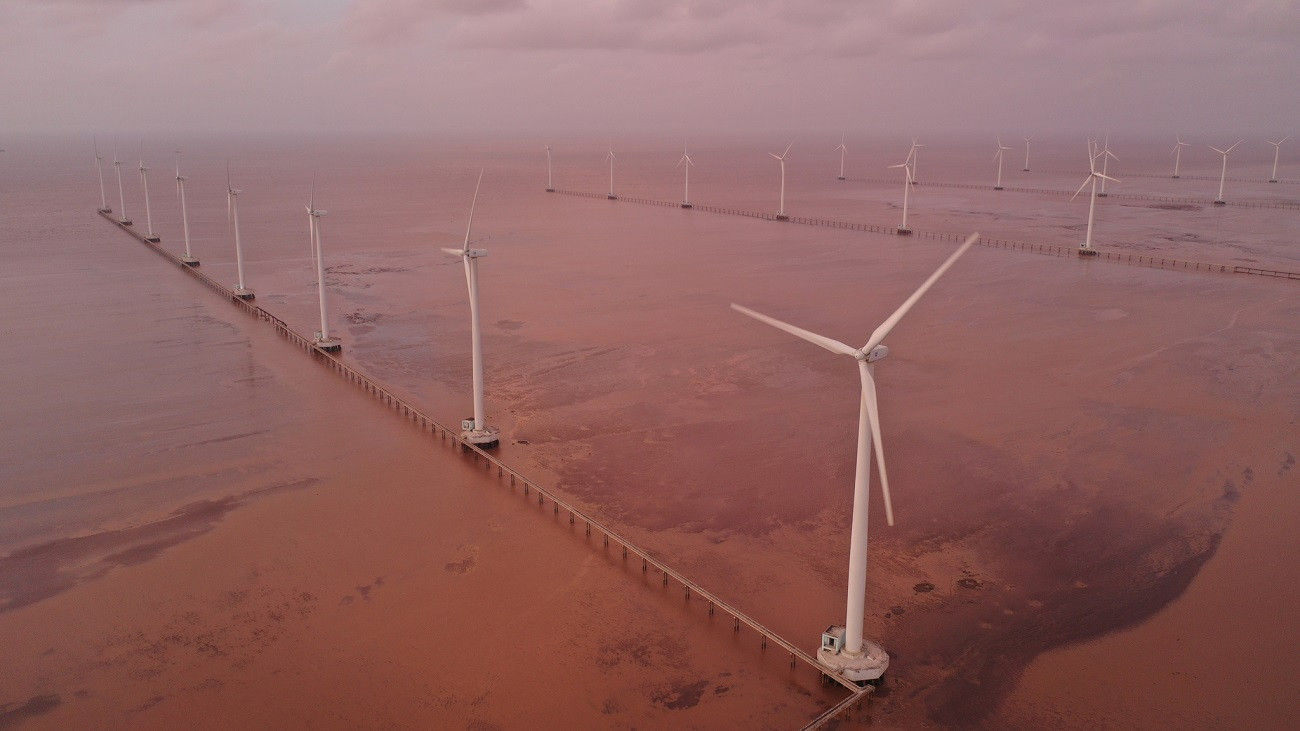
On August 29, the joint PTSC – Sembcorp was granted a license to survey territorial waters to prepare for the development of an offshore wind power project which will export electricity to Singapore.
The license granting ceremony took place with the witness of Vietnamese PM Pham Minh Chinh, Singaporean Prime Minister Lee Hsien Loong and representatives of ministries and branches of the two countries, and the leaders of the national oil and gas corporation PetroVietnam.
The Ministry of Natural Resources and the Environment (MONRE) of Vietnam granted approval for the Petroleum Technical Services Corporation (PTSC), a subsidiary of Petrovietnam to monitor, investigate, survey and assess marine resources (survey license).
Meanwhile, Sembcorp Utilities Pte Ltd (Sembcorp), the partner of PTSC, received a letter of intent approving the project from the Singaporean Ministry of Trade and Industry.
The event marked a milestone for the PTSC – Sembcorp to take the next steps to implement the project on developing renewables offshore of Vietnam and export the electricity from the project to Singapore.
After receiving the licenses, the PTSC - Sembcorp will carry out wind measurement, marine and geological surveys in areas off the coast of Ba Ria - Vung Tau province to collect necessary data for project development.
In February, in Singapore, PTSC and Sembcorp signed a JDA (joint development agreement) on investment cooperation to export electricity to be generated from Vietnam’s offshore renewable energy sources to Singapore.
Big ambition, challenges
Speaking at the 17th Ministers’ Conference on Vietnam-Singapore economic connection held on August 27, Vietnamese Minister of Planning and Investment Nguyen Chi Dung said the energy sector is an important new cooperation pillar added to the framework agreement connecting the two economies of Vietnam and Singapore, with great potential for cooperation.
Dung said, at the 16th conference, the two sides had preliminary exchanges about the possibility of the two countries cooperating in the field of renewable energy, and the opportunity for Vietnam to sell electricity to Singapore from its renewables projects.
To date, many localities in Vietnam have expressed interest in exporting renewable power to Singapore.
In a statement on the eighth national power development plan (Plan 8), MOIT also proposed giving priority to the limitless development of electricity sources from renewable energy for export and the production of new energy types, such as green hydrogen and ammonia, for ensuring energy security and high economic efficiency.
MOIT hopes that by 2030 the scale of electricity export capacity will reach 5,000-10,000MW.
Contributing ideas to the plan, the Ministry of Planning and Investment said it is necessary to conduct research on offshore wind power capacity by zone by 2030, and draw up a list of projects and project locations.
Tran Dinh Thien, former head of the Vietnam Economics Institute, has said that Vietnam can export electricity if it can develop electricity sources in a reasonable way.
However, to export electricity, Vietnam will need to invest in an underground cable system. The project that PTSC – Sembcorp is developing considers this investment. Under the agreement, PTSC and SCU will cooperate to invest in offshore wind power farms in Vietnam with expected initial capacity of 2.3GW and export electricity directly to Singapore via a submarine high-voltage cable system.
PTSC CEO Le Manh Cuong said this is one of the challenges of the project, but many similar projects have been implemented globally, such as the 720 kilometer 1,400MW North Sea Link that connects electricity network and shares electricity sources from renewable energy between Norway and the UK.
He believes the challenge can be solved by arranging a sufficiently large ESS (energy storage system) and applying technological solutions to minimize energy losses during transmission.
Analysts commented that exporting renewable power as shown in Plan 8 is really a very ambitious plan, noting that Vietnam itself is still lacking electricity and the situation would last several more years. Meanwhile, a huge amount of investment capital will be needed to realize the plan on ensuring enough electricity for the national economy and export.
Also, there must be breakthroughs in policies for power development and strong political determination to be able to implement the ambitious plan.
Luong Bang